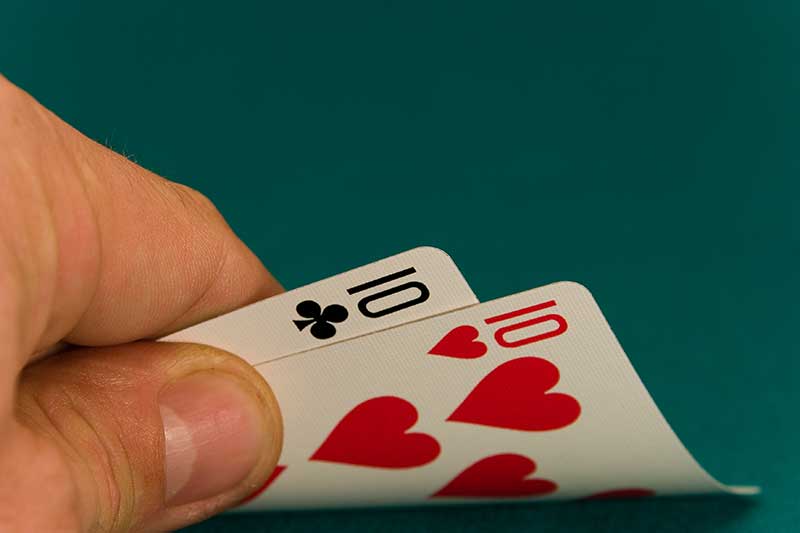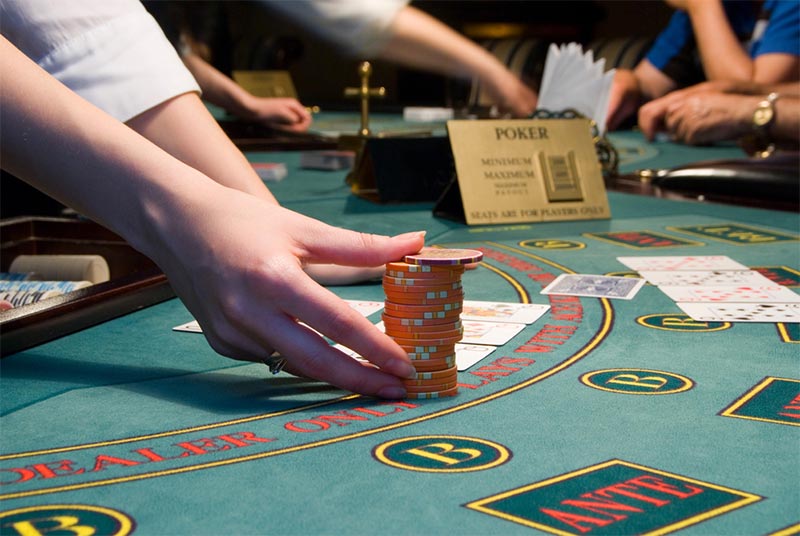It is bad to split 10s in blackjack because it reduces your expected value (return) and your odds of winning. It also goes against the basic blackjack strategy, which says you should never split a pair of tens (10s) or fives (5s).
Splitting 10s Reduces your Odds of Winning by 14%
Statistical data reveals that a player who splits a pair of tens has a 64% winning chance and a 36% probability of a loss when playing against a dealer’s up-card of 6. That means your net gain is 28% when you split 10s versus a dealer 6, or 56% for both split hands.
On the other hand, if you stand on a pat 20 (10-10), you will win 85% of the time and risk a loss probability of just 15%. In other words, your expected gain is 70% when you stand on a pair of tens against the dealer’s 6.

When you compare the two figures, you can see that splitting reduces your profit margin or odds of winning by a significant 14%.
Splitting Tens Reduces the Amount of Money You Can Potentially Make Playing Blackjack
When you split a pair of tens, you can expect to win $56 for every $100 wagered against the dealer’s up-card of 6. However, if you stay with your pair, your choice will result in a win of $70 for every $100 wagered. So, you stand to win $14 more money when you stand on a pair of tens than splitting against the dealer’s 6-up-card.
Planning Your Next Move with a Pair of Tens
Most blackjack gamers choose to split a pair of 10s since it results in two hands with a starting card of ten. The chances of drawing another ten aren’t great, though. Instead of two high hands and double rewards, you’re more likely to get two poor and loser hands.
For more experienced blackjack players, the previous strategy is considered illogical. Yes, 10 is an excellent starter card. Nonetheless, a hand with a value of 20 is stronger and more likely to beat the dealer’s hand. Furthermore, losing with such a hand is less frequent. Finally, you will learn that having one exceptional hand is always preferable to having two average hands.
We recommend you opt for the sure bet — standing instead of splitting. Things might take a very different turn after you split.
Getting 10s or anything higher than 9s is possible, but the dealer may also knock you out with 4s and 5s. Bear in mind that a hand of tens has one of the best odds of winning (85%, in fact), so splitting it up and taking a chance on split hands individually makes little to no sense.
Should you split 10s?
The answer is a strong no; you should not split 10s. It is a fairly straightforward basic strategy you should learn when getting your feet wet in the blackjack universe.
Even glancing at the basic blackjack strategy shows that splitting a pair of tens or 5s is a sin.
However, as with many gambling strategies, the complete solution and the simple answer are oddly far between. Although splitting tens is considered a bad idea in a blackjack strategy, it is not the worst thing you can do. After all, splitting a pair of 10s versus a dealer card of 6 still has a decent winning probability of 64%.
There are Two Types of Blackjack Players Who Split 10s
The bottom line in blackjack, as far as splitting tens goes, should be:
- Professional card counters should split 10s in decks that are rich in tens
- Average blackjack players avoid splitting ten pairs and instead stand on pat 20
- Smart tournament players can split a pair of 10s if they wish to wager more playing chips, particularly when it is the last hand or round.
As you can see, there are generally two types of players who are ten-splitters…
(1) The inexperienced newbie
This player has little to no knowledge of strategy or advantage play, not to mention no desire to learn advanced strategies. They come to the tables for entertainment, to interact with a larger crowd, or are simply terrible at blackjack! If you fall under this category, you should strive to become an expert basic strategy player.
(2) The professional card counters and blackjack tournaments players
The second type of player who tends to split tens is a true pro, someone who has mastered the ins and outs of the beautiful game of blackjack. They have a deep command of table rules, basic strategy, and advanced tactics like card counting. This kind of player knows the statistical or mathematical reasoning behind their decision to split a pair of tens in deviation from the basic strategy.

When It Is Okay to Split 10s
There are only two situations when splitting tens is considered to be okay:
- When you are in a blackjack tournament, you need to wager more playing chips to win, particularly if the final chip count matters at the end of the contest. Or,
- When you are counting cards, and the shoe is rich in tens. So, if you are a card counter and see advantage in a 10-rich shoe, you should not hesitate to splitting 10s.
Why do you split 8s against a 10?
You should split a pair of 8s against most dealer cards, except against an ace if the dealer hits on soft 17. That is because splitting such a pair of eights offers the most expected value of all viable options, including doubling down, surrendering, standing, or hitting.
Why do people split 10s?
Some people who play blackjack split 10s because they are amateurs who are none the wiser. They are not learned or mastered the basic blackjack strategy, which stipulates that you should never split a pair of tens.
On the other hand, professional blackjack players may split 10s if their count shows the shoe has a high content of ten-value cards. Tournament players may also prefer splitting over standing on a pair of 10s to spend more chips.
Do you split a pair of 9s against a 10?
No, you should not split 9s against a dealer card of 10. Instead, you should consider standing on a pair of 9s because your chances of winning are higher against the dealer’s up-card of 10.
